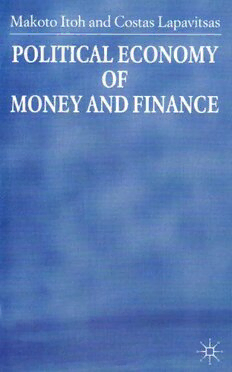
Political Economy of Money and Finance PDF
320 Pages·1998·13.623 MB·English
Most books are stored in the elastic cloud where traffic is expensive. For this reason, we have a limit on daily download.
Preview Political Economy of Money and Finance
Description:
Pronounced instability has characterised the capitalist world economy since the early 1970s, much of it originating in the mechanisms of money and finance. Several different government policies have failed to restore harmony, often appearing to exacerbate economic instability. This volume argues that monetary and financial instability has its roots in capitalist production and trade themselves, as well as in the defects of the mechanisms of money and finance. Thus, no mix of policies can fully establish monetary and financial harmony, though different policies can significantly amerliorate or worsen instability. To sustain its central claim, the book re-examines the historical and logical origin of money, the creation of interest-bearing capital, the spontaneous emergence of a capitalist credit system, the mechanism of capitalist crises, and the nature and functions of central banks. Further support is provided by the systematic examination of the monetary and financial analysis of all of the important schools of thought, including Classical political economy, Marxism, Keynesianism, Post-keynesianism and monetarism. The authors' ability to present important insights from Japanese political economy, not previously discussed in Anglo-Saxon economies, makes this a highly significant work in radial political economy, offering a systematic and up-to-date Marxist analysis.
See more
The list of books you might like
Most books are stored in the elastic cloud where traffic is expensive. For this reason, we have a limit on daily download.
